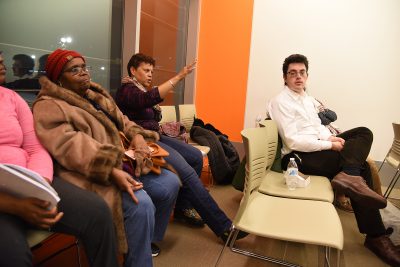
Fifteen Boston residents gathered in the Mattapan Community Health Center Monday evening for the last event of Imagine Boston 2030’s weeklong series, where residents could provide feedback and ask questions about data trends in the city’s growing workforce.
Mayor Martin Walsh announced the Imagine Boston 2030 week to offer residents the opportunity to talk directly with Imagine Boston 2030 leaders about Expanding Opportunity, a draft plan for the city’s future growth, according to a press release issued by Walsh’s office on Nov. 21.
Imagine Boston 2030 is the first city-wide planning effort in 50 years, according to the release. With input from the public, Walsh’s initiative hopes to create a framework to guide expanding opportunities, support a dynamic economy, enhance quality of life and prepare for climate change, according to the release.
Over the last year, more than 12,000 people around the city have shared their vision for the future of Boston, according to the release.
Natalia Urtubey, director of engagement for Imagine Boston 2030, said the city hosted the week of events because organizers wanted to help people visualize what is going on in the city.
“We wanted to create some week-long events that tie into location and the different spaces around the city,” Urtubey said during Monday’s event. “Some of these initiatives will launch right away, while others will take much longer. We have metrics that are going on with each initiative in hopes of having at least the framework and getting everything ready.”
The discussion included a presentation on how student loans tie into Imagine Boston 2030’s planning initiatives.
During this presentation, Matthew Resseger, senior economist for the Boston Planning and Development Agency, said that a major problem facing Boston residents is paying back student loans without the high substance of a degree.
“Areas like Mattapan and Franklin Park are two of the highest areas of overdue student loan balances,” Resseger said. “We are thinking about [student debt] in terms of the city’s initiatives towards affordability in colleges … in the Imagine Boston 2030 process.”
Rebekah Emanuel, the executive director of Imagine Boston 2030, said another key initiative of Imagine Boston 2030 is working toward a more climate-ready city.
“One of the things Imagine Boston 2030 is working on is making Boston a climate ready zone. It is in its first stage and the components of it are not there yet, but there are early hypotheses for it,” Emanuel said.
Boston is the fourth-most exposed city on the East Coast, making it vulnerable to storms, increasing sea levels and more extreme weather changes, Emanuel said.
Emanuel noted several solutions, such as the possibility of seawalls due to the increase of tides and the rise of sea levels. She said that areas like South Boston and the Seaport District are more vulnerable to flooding because they have “more open channels” than other neighborhoods.
After the discussion, several Boston residents expressed their opinions on the changes they most wanted to see by 2030.
Gillian Straughan, 53, of Mattapan, said she would like to see the city use the term “affordable change.”
“There is a lot of stuff that people say is affordable, and I cannot afford it,” Straughan said. “Who is it affordable for?”
Mireille Louis, 49, of Mattapan, said the current definition of affordability is unfair.
“The median income formula which is used to calculate the definition of ‘affordable’ in different neighbors doesn’t account for how many jobs each individual person has to make to get to that so-called ‘affordable’ number,” Louis said. “So then the rest of us are lost on what is affordable and what isn’t.”
Regina McClay, 66, of Roxbury, said she would love to see Boston focus on two areas: education and connectivity within neighborhoods.
“The sense of belonging is missing,” McClay said. “It is not just because the jobs are not there, but because people do not mingle together … Every high rise has some form of lead-up groups and they create social groups, but our area of town lacks that completely. The city can foster some of those thoughts and actions.”



















































































































